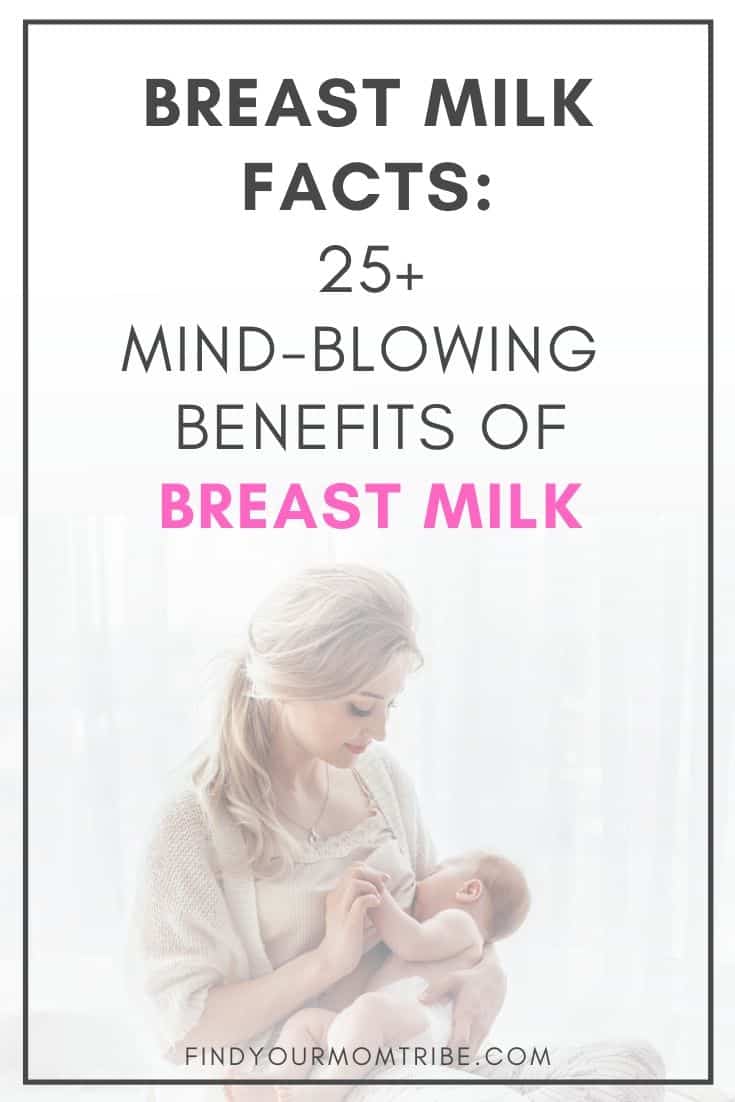It’s a scientific fact that breast milk is amazing.
There are countless benefits of breastfeeding for both mom and baby, some of which haven’t even been discovered yet!
In this article you’ll learn:
- What leading medical organizations recommend about breastfeeding
- How breast milk differs from formula
- Benefits of breastfeeding for mom
- Benefits of breastfeeding for baby
Before we dive in, just a little disclaimer.
This article isn’t about “breast is best” or “fed is best.” It’s not about what decision you did or didn’t make about how to feed your baby.
This is not a mom-shaming article or a guilt trip.
If any of this information makes you feel triggered, please feel free to click away and read some other great articles on the blog.
Recommended Reading:
- 10 Little-Known Tricks to Pump More Breast Milk
- How Much Does A Newborn Eat? Feeding FAQs Answered
- Lactogenic Food: Top 20 Ingredients For A Better Milk Supply
- Switching From Breast Milk To Formula: Step By Step Guide
Okay, let’s get started!
1. Breastfeeding is universally recommended
I have searched high and low and I have not been able to find a single medical organization that recommends formula feeding in lieu of breastfeeding.
Let’s review a few statements from medical organizations around the world.
Here’s what the World Health Organization says about breastfeeding: “Breastfeeding is an unequaled way of providing ideal food for the healthy growth and development of infants; it is also an integral part of the reproductive process with important implications for the health of mothers.
As a global public health recommendation, infants should be exclusively breastfed for the first six months of life to achieve optimal growth, development and health.
Thereafter, to meet their evolving nutritional requirements, infants should receive nutritionally adequate and safe complementary foods while breastfeeding continues for up to two years of age or beyond.
Exclusive breastfeeding from birth is possible except for a few medical conditions, and unrestricted exclusive breastfeeding results in ample milk production.”
Canadian Paediatric Society: “Breastfeeding – exclusively for the first six months, and continued for up to two years or longer with appropriate complementary feeding – is important for the nutrition, immunologic protection, growth and development of infants and toddlers.”
Australian Medical Association: Breastfeeding has been found to provide physiological benefits to the infant, as well as physical, psychological and pragmatic benefits to the mother.
Breastfeeding can improve cognitive development, reduce the risk of obesity, diabetes, infection, cardiovascular disease and asthma in infants.
The maternal benefits of breastfeeding include decreased risk of breast cancer, decreased risk of ovarian cancer and osteoporosis.
Breastfeeding is also known to play an important role in the establishment of a healthy attachment between mother and child.
Secure early attachment is an important foundation for healthy child development.

2. Breast milk is different than formula
Okay, please don’t be offended by that statement!
Again, this isn’t about “breast is best” or “fed is best” or what is better for you and your family.
It’s not about making anyone using formula feel guilty or “less than”…
Taking the emotion and setting it aside, scientifically if you look at breast milk’s ingredients and components in comparison to formula, breast milk is the winner by a landslide.
Breast milk is so powerful and beneficial, that’s why every health care organization recommends it.

3. Ingredients breast milk has that formula does not
Omega 3’s
While some formula contains added DHA, breast milk is specially formulated to give your baby a boost in the beginning, and slowly DHA levels decline as the baby gets older.
These fats build baby’s growing brain and body. They also protect the child from adult heart and central nervous system diseases.
The type of fats found in breast milk are very easily digested and absorbed.

Specialty Proteins
While formula does contain protein, it doesn’t contain the human variety.
In breast milk the ratio of whey to casein is the perfect balance, allowing it to be more easily digested.
Lactoferrin is a type of protein found only in breast milk that inhibits certain types of bad bacteria from growing in baby’s gut.
Secretory IgA is a type of protein that protects the baby from viruses and bacteria. (Also E. Coli!)
The really cool thing about this is that when the baby or mother is exposed to a certain germ, mom’s breast milk will change in composition to produce the antibodies the baby needs to protect it from illness.
(Not to say breastfed babies don’t get sick at all, but IgA is powerful stuff to help keep them well and when they do get sick, help them recover more quickly.)
Lysozyme is also a protein enzyme that is an antimicrobial and protects against E. Coli and Salmonella. It also helps promote healthy flora in the gut and is anti-inflammatory.

Fascinating breast milk research:
In 2012, Duke University researchers published a study in the journal Current Nutrition & Food Science.
In the study, researchers grew bacteria in samples of whole milk, cow’s milk formula, soy-milk formula, and breast milk. (The bacteria grown were two strains of E. coli bacteria.)
The study reported that the bacteria began growing within all the specimens right away. In the breast milk specimens, the bacteria stuck together and made biofilms.
(Biofilms are like shields – thin layers that protect against infections.)
In contrast, the soy and cow milk samples “proliferated wildly” and grew as individual organisms, not coming together to form a protective barrier.
Human Lactose
When we think about lactose, we often think about milk and some people being lactose-intolerant.
Well, human lactose is different than bovine lactose.
(The amino acid sequence is different, among other things.) Human lactose is actually a really important carbohydrate for brain development.

Immune Strengtheners
Each time you feed your baby breast milk, you’re giving her millions of living white blood cells. (Even higher amounts are found in colostrums!)
White blood cells fight infections from bacteria, viruses, fungi, and infection-causing organisms.
White blood cells can sense infections, gather at the site, and destroy the pathogens.
(Did you see this photo on Facebook that went viral a while back? These are Petri dishes of bacteria with a drop of breast milk in the center. You can literally see how the milk is killing the bacteria around it!)
Other immune boosters in breast milk are immunoglobulins, also known as antibodies.
We already talked about a few above in the protein section, but it’s also worth mentioning that there are molecules produced in the urinary tract of breastfed babies that protects him or her from urinary tract infections.

Bioavailable vitamins and minerals
While formula also contains vitamins and minerals, breast milk has higher bioavailability and is more easily absorbed in babies.
Formula manufacturers have to compensate for the decreased bioavailability, so they add more vitamins and minerals than the baby needs.
This also makes formula harder to digest than breast milk.

Enzymes and Hormones
Breast milk contains digestive enzymes (lipase and amylase) which are good for intestinal health.
RELATED: Is High Lipase Milk A Problem And How To Deal With It?
Hormones such as thyroid, prolactin, oxytocin, and many others help with the baby’s biochemical balance.

Sleep-inducers
Breast milk also contains sleep-inducing amino acids and nucleotides. (Yay, sleep!)
Concentrations are highest between 8 pm and 8 am. This is why it’s important for pumping moms to write down the time of day you pumped the milk.
Milk pumped at night should be fed to baby at night to help him sleep better.
Contrary to popular belief, it seems that breastfeeding moms actually get more sleep than formula feeding moms.

A 2011 study was done on over 6,000 mothers of babies 0-12 months old and their sleep. Breastfeeding moms got an average of 6.61 hours sleep, while formula feeding moms got an average of 6.3 hours.
Not a huge difference, but every minute counts, right?
Sources:
-
- Comparison of Human Milk and Formula
- Human milk proteins: separation of whey proteins and their analysis by polyacrylamide gel electrophoresis, fast protein liquid chromatography (FPLC) gel filtration, and anion-exchange chromatography.
- How Breast Milk Protects Newborns
- Petri dish experiment shows the amazing powers of breast milk
- Exclusively Breastfeeding Mothers Get More Sleep: Another Look at Nighttime Breastfeeding and Postpartum Depression
- The Possible Role of Human Milk Nucleotides as Sleep Inducers
f
4. Benefits of breast milk for mom, too.
Reduced risk of postpartum hemorrhage
The hormones released when baby suckles at the breast after birth produces contractions in the uterus to help prevent postpartum hemorrhage.
These contractions also help the uterus shrink back down to a non-pregnant state.

Decreased risk of breast cancer
Not breastfeeding (or breastfeeding for less than three months) increases your risk of breast cancer.
Breastfeeding between 4-12 months can decrease your breast cancer risk by 11 percent.
If all breastfeeding mothers breastfed for 24 months or longer, their risk of breast cancer would be reduced by nearly 25 percent.

Decreased risk of osteoporosis
One study conducted showed that women with osteoporosis who did not breastfeed were 4 times higher.
Decreased risk of ovarian cancer
A multinational hospital-based study conducted between 1979 and 1988 showed that either short-term or long-term lactation “may provide a great reduction in risk.”

Making milk burns calories
Eat up, mama! Making milk burns an estimated 300-500 calories per day making that liquid gold.
Sources:
- Lactation and the risk of epithelial ovarian cancer. The WHO Collaborative Study of Neoplasia and Steroid Contraceptives.Ncbi.nlm.nih.gov/pubmed/
8505173 - Lawrence, R., Lawrence, R. Breastfeeding: A Guide for the Medical Profession. St. Louis: Mosby, 1999.
- Newcomb, P. et al. Lactation and a reduced risk of postmenopausal breast cancer.New England Journal of Medicine 1994; 330:81.
- Riordan J. Breastfeeding and Human Lactation, Sudbury, Massachusetts: Jones and Bartlett; 2004.
- Salari, P, Abdollahi M. The Influence of Pregnancy and Lactation on Maternal Bone Health: A Systematic Review. Journal of Family & Reproductive Health. 2014;8(4): 135-148.
5. Some of the many benefits of breastfeeding for babies
We’ve already talked about how breast milk protects babies against illnesses, infections, and sicknesses, but let’s talk about some of the other benefits.
Reduced risk of some childhood cancers
Many studies have been done on breastfeeding and childhood cancers. In 2004, University of California, Berkeley researchers analyzed 14 studies published between 1988 and 2003.
Researchers found that breastfeeding was linked to lower risks of the most common childhood cancer, Acute Lymphoblastic Leukemia (ALL) and Acute Myeloblastic Leukemia (AML).

Decreased risk of allergies and asthma
Babies who are formula fed have increased risk of food allergies, respiratory allergies, and atopic eczema.
One study concluded that six-year-old children were more likely to have asthma if they hadn’t been exclusively breastfed at least 4 months.

Decreased risk of SIDS
Sudden Infant Death Syndrome is something that nearly every mom worries about but no one likes to talk about. Many studies have been conducted about SIDS and breastfeeding.
These studies have shown that breastfeeding can reduce a baby’s risk of SIDS by at least half.

Possible higher IQ
This is a hotly-debated topic. If you research breastfeeding and IQ, you’ll find some studies that say breastfeeding can increase IQ levels by up to 10 points.
Other studies say breastfeeding had very little impact on IQ levels.

Decreased risk of obesity
German researchers did find a 40% higher prevalence of obesity in children who were formula-fed as babies.
Decreased risk of cardiovascular disease
The adults who were formula-fed as babies had higher cholesterol levels, which increased the risk of cardiovascular disease. This suggests that breastfeeding benefits extend well into adulthood.

As you know, there are many other benefits of breast milk for babies.
We could literally spend all day talking about them. But what I wanted to do was to give you an overview of some of the many benefits.
Having this knowledge about how powerful breast milk is will help you make it through the hard days. It will give you extra determination to help you push through any struggles you may have.
And, it will help you feel confident that you are providing the absolute best nutrition for your baby.

Sources:
- Hauck FR, Thompson JM, Tanabe KO, Moon RY, Vennemann MM. Breastfeeding and reduced risk of sudden infant death syndrome: a meta-analysis. Pediatrics. 2011 Jul;128(1): 103-110.
- Kwan ML, Buffler PA, Abrams B, Kiley VA. Breastfeeding and the risk of childhood leukemia: a meta-analysis. Public Health Reports. 2004; 119(6): 521-535.
- Mortensen EL et al. The association between duration of breastfeeding and adult intelligence. JAMA 287:2365-71.
- Oddy W.H., et al. BMJ 1999;319:815-819.
- Ravelli, AC. Infant feeding and adult glucose tolerance, lipid profile, blood pressure and obesity. Arch Dis Child 2000; 82(3):248-52.
- Saarinen UM, Kajossari M. Breastfeeding as prophylaxis against atopic disease: prospective follow-up study until 17 years old. Lancet. 1995;346:1065-1069.
- Thompson JMD, Tanabe K, Moon RY, Mitchell EA, McGarvey C, Tappin D, Blair PS, Hauck FR. Duration of Breastfeeding and Risk of SIDS: An Individual Participant Data Meta-Analysis.Pediatrics. 2017 Nov;140(5)
- Von Kries, R. et al. Breast feeding and obesity: Cross sectional study. British Med J. 1999; 319(7203): 147-50.
Like this article? Please share or pin it for later. You can also stay in the loop and follow us on Facebook, Instagram or Pinterest.

This post contains affiliate links. Please see our full disclosure for more info.


Desiree Powell
Tuesday 6th of December 2022
Nice post. I learn something totally new and challenging on websites
Sophie
Wednesday 15th of May 2019
Such an informative article. I learned so much. Thanks!